Accidentally
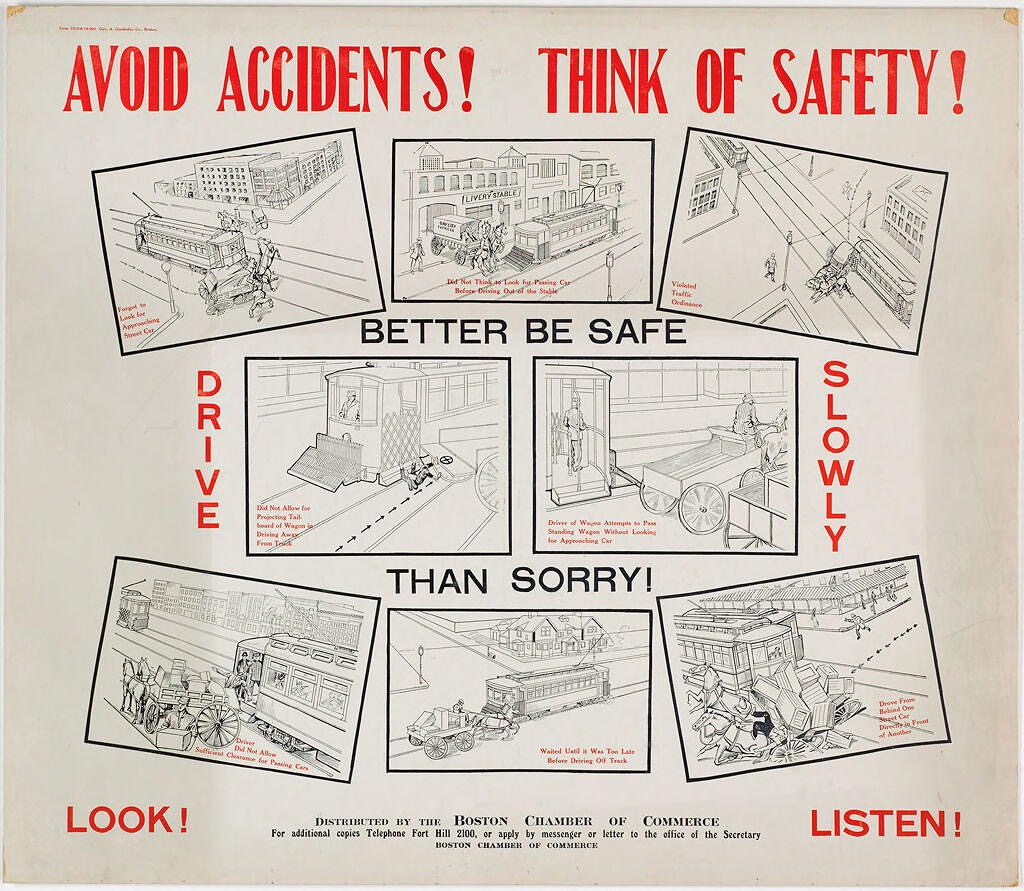
Unidentified Artist: Avoid Accidents! Think of Safety!
[Series/Book Title: Social Museum Collection] (c. 1903)
" … we ended up Accidentially thriving there …"
Our Exile separated The Muse and me from much more than our beloved home. It also separated us from our accustomed means of thriving. The Bankruptcy cleaned out our liquidity and, with that, our sense of identity. If we lacked money, how would we be able to continue pursuing our purpose? How would we be able to purchase what we needed to survive, especially once we'd relocated into one of the pricier housing markets in the country? We had no idea how we'd survive. We kept moving forward As If, perhaps taking heart from the parable of The Birds of the Field, who apparently manage to get by without the usual means to survive. They manage to live Accidentally On Purpose if that makes any sense. Of course, that notion makes no sense whatsoever to anyone schooled in this culture. Here, we carefully plot our course before purchasing passage. We thrive through planning, or so we continually insist. We're schooled to avoid accidents and believe that accidents result from poor planning and that accidents suggest terrible things about us. We even revile the accident-prone.
The Muse and I set about living Accidentally On Purpose.
Familiars
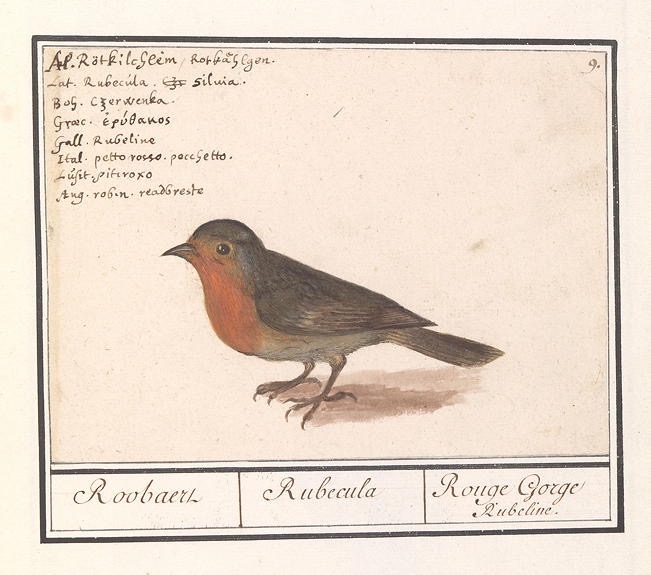
Anselmus Boëtius de Boodt: Robin
[Erithacus rubecula] (1596 - 1610)
" … long ago when I still expected novelty to light my way home."
I sought out novelty before we were Exiled. After, I felt more attracted to Familiar things, to Familiars. Before, I'd considered myself adventurous when seeking some odd or unusual experience. I'd order the wild boar in the restaurant and seek out the Stearnwheeler supper cruise. I'd gather these experiences like some collect bracelet charms, believing myself especially blessed and a bit courageous. I once drove over an hour to find a trailer in the Arizona desert where a retired fireman from Poughkeepsie had set up shop selling rattlesnake rattles so I could return from that trip with unique gifts for my kids. I preferred to take the less-traveled roads and thought myself unique. That was before I was Exiled.
After being Exiled, I sought out Familiars, even the formerly banal ones.
Leaving

Harry Sternberg:
Father Leaving Home with Suitcase
[Series/Book Title: Life in Woodcuts] (20th century)
"I no longer need to take leave."
The drive up and out of The Walla Walla Valley that first morning of Exile felt promising, for our possessions were already on their way, and we'd been left behind. It seemed as though we were only trying to catch up to our life as we headed East across the Blue Mountains and on through Southern Idaho into Utah. We made Evanston that first evening, just as far as my to-be first wife and I had made it the first morning of our initial Exile thirty-five years earlier. We were catching up to our lives then, too. She was chasing her first job after graduating from university, and I was tagging along, heading into what was then still a seemingly great unknown. I was twenty-two and had never experienced humidity, which made me a virgin of sorts. I'd never imagined what most of the rest of the country routinely experienced, clear evidence that I'd left Eden for some alternate universe inhabited by heathens. Why would any sentient being tolerate high humidity? It did not make sense!
With that first Exile experience and a lifetime's accumulation of others, I'd grown familiar with Leaving.
Weekly Writing Summary For The Week Ending 9/26/2024
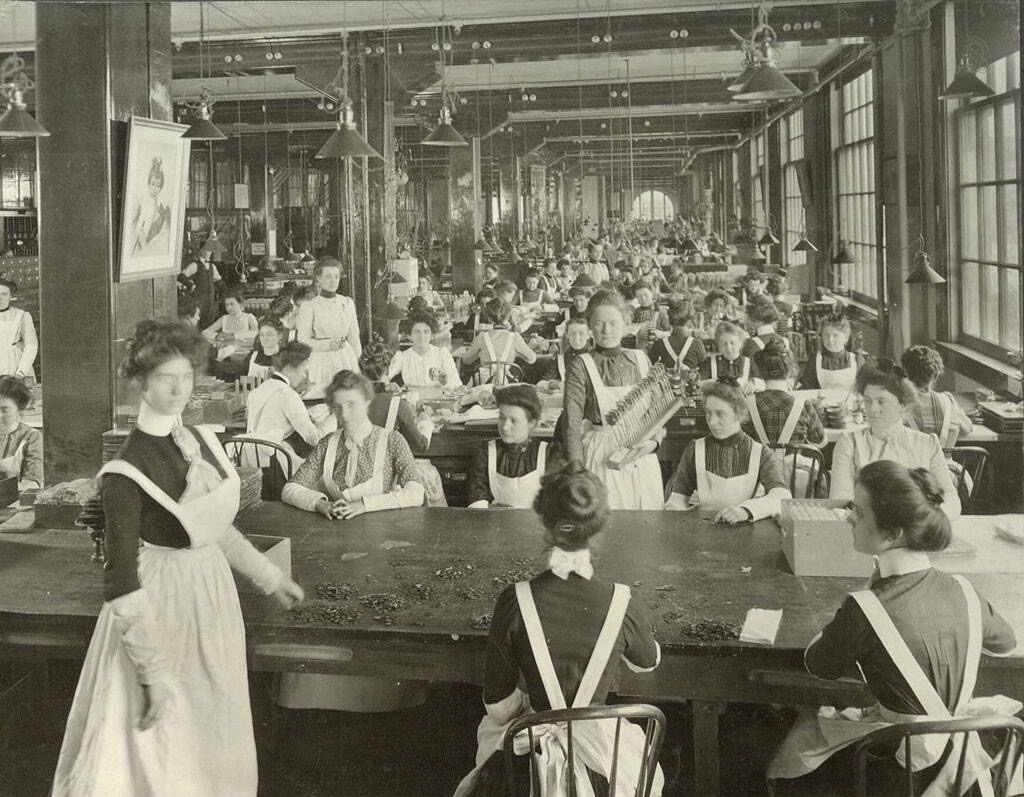
Unidentified Artist: Industrial Problems, Welfare Work: United States. Ohio. Dayton. National Cash Register Company: Welfare Institutions of the National Cash Register Company, Dayton, Ohio.: Departments: Showing White Aprons
Series/Book Title: Social Museum Collection (c. 1903)
A Requisite Humility
Six hundred and sixty square feet of clear verticle grain Douglas Fir tongue and groove boards were delivered to my driveway yesterday. They represent the start of the final chapter in a two-year quest to refurbish our formerly beleaguered front porch here at The Villa Vatta Schmaltz. Those who have been paying attention will have noticed the continuing disruptions I've been reporting for nearly two months. At least two more months of effort remain to finish constructing the structure that will support the porch deck and then to lay those lovely gold-plated deck boards and the bead board ceiling, not to mention the dressing out of the new posts and beams and the construction of the new railing, top and bottom. My role in all this effort has largely been as sponsor and chief miscommunicator, for however skilled I might be as a writer, I suck as the supervisor of construction efforts. The workers speak in nearly indecipherable dialects heavy with incomprehensible terms. I banter through sixteen-inch centers as if I understand what I am saying. I later learned that I sometimes misrepresent my best interests by simply showing interest. Those trying to read the boss imperil the whole enterprise. Any boss trying actually to boss anybody proves to be a serious hazard to navigation. I am reminded how critically important ineptness always proves to be in every undertaking. It usually insists upon a requisite humility and more patience than Job.
CashEconomy
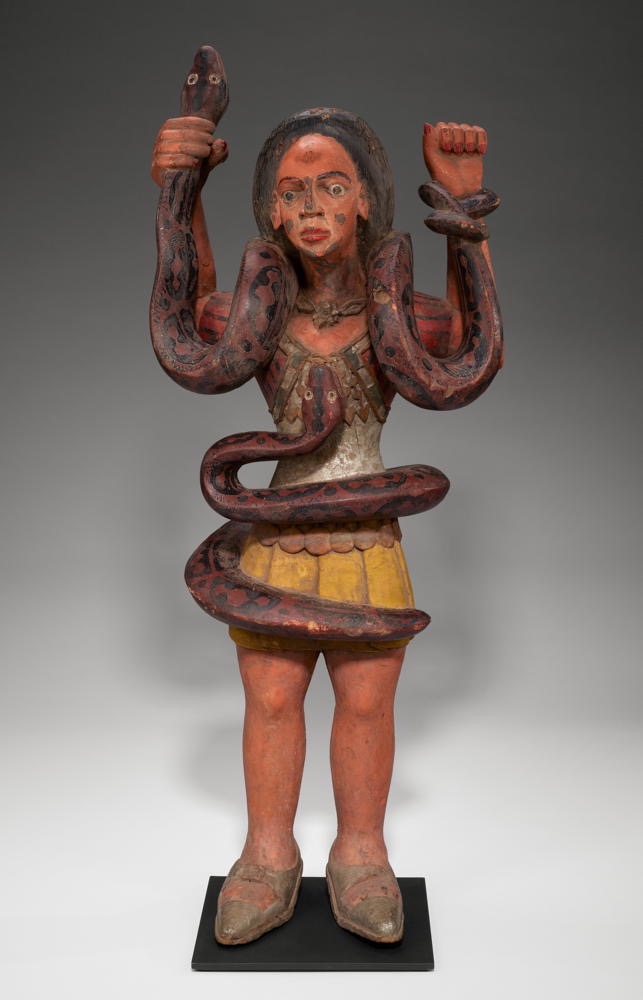
Unknown Igbo Artist: Mami Wata figure (1950s)
"I might have been broke, but never broken."
The bankruptcy rendered us effectively insolvent. We entered a previously unperceived CashEconomy. It was as if the economy had suddenly returned to the gold standard, and we had no access to gold. Modern economies do not trouble themselves very much with cash. It serves more as an artifact than as a means of exchange. It becomes a metaphor, a way of speaking about value rather than a means for holding it. Modern economies transact exchanges with symbols once or more times removed from actual specie, just as CashEconomies sit at least once removed from their underlying gold. It's enough that Fort Knox holds reserves. Remember, it became illegal for private citizens to hold too much gold, even when we were still on the so-called gold standard. Such conventions ultimately came to limit economic potential, and so were done away with in favor of plastic and similar, more imaginative systems.
The most profound initial effect of the bankruptcy was a radical loss of liquidity.
Hopefulling
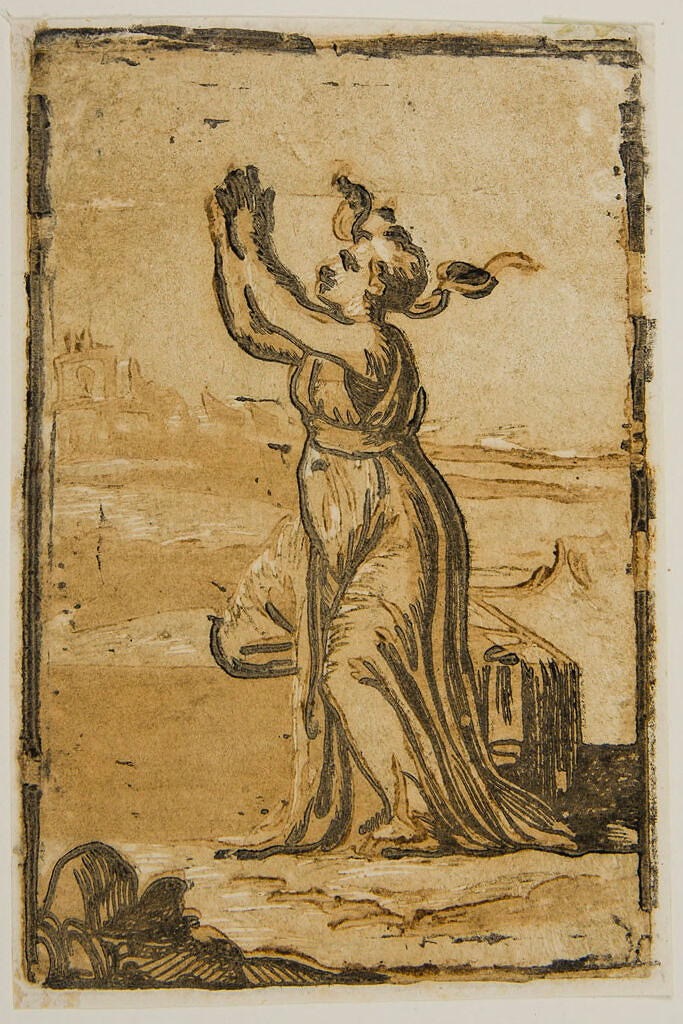
"(Giuseppe Niccolò Vicentino)(After Parmigianino)
(Previously attributed to Circle of Ugo da Carpi): Hope
(Sixteenth Century)
"We were never caught once."
We entered our Exile curiously hopeful. We had every right to engage in despair, for we had fallen far. We'd been within a month of moving into barrels, becoming cartoon-character destitute wearing barrels with suspenders, yet we felt hopeful instead. Obama had just been inaugurated, and Hope was in the air. We would be there, near where the upcoming miracle would happen, next to ground zero of the transformation. The Muse would even participate in her role in the bowels of The Department of Energy's Biofuels Development Office.
My role was unclear.
BeneathMe
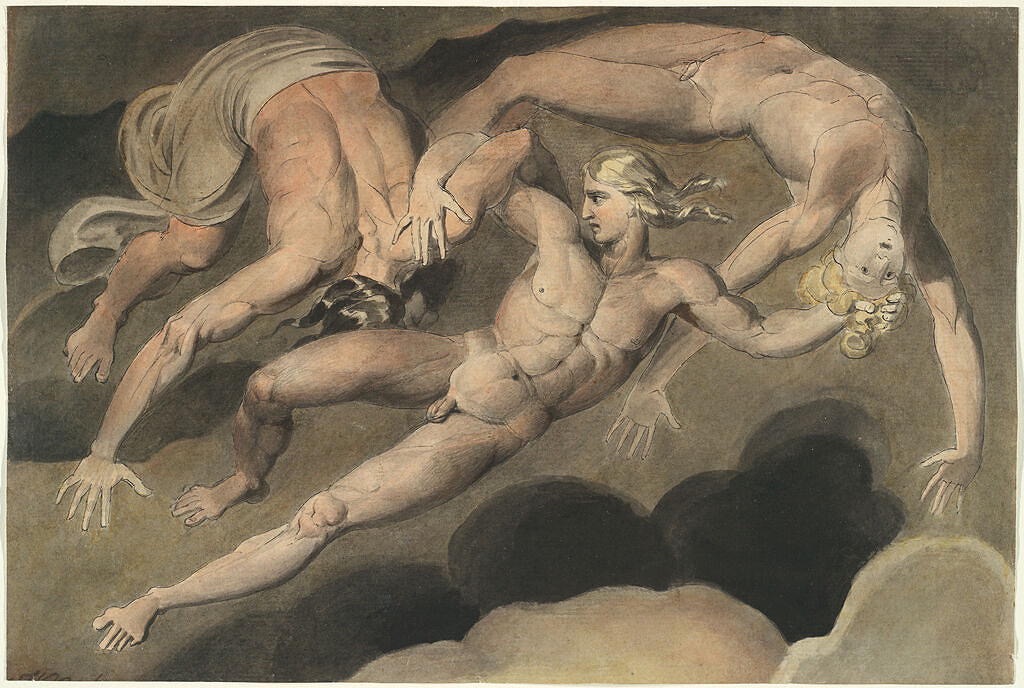
William Blake: Fallen Angels,
Alternate Title: Three Falling Figures (c. 1793)
"Maybe I could find a new identity, even one AboveMe there."
While attending university in Portland, my first wife and I lived in a main-floor-of-an-old-house apartment on a busy arterial. When friends moved out of their main-floor-of-an-old-house apartment on top of Mt. Tabor with views of both Mt. Hood and Mt. Saint Helens, we moved in a minute and soon came to think of ourselves as the sort of people who lived on top of one of the more prominent vistas in the city. Later, when our landlord decided to raise the rent by the amount of the increase in the Consumer Price Index each month, we decided to buy a house. The best we could afford was located down in what we called The Flats, a neighborhood far beneath our accustomed station, with industrial operations squeezed between houses. The adjacent milk bottling plant left the neighborhood smelling of sour milk most mornings. All claims to have been urban pioneering aside, we felt as if we had been Exiled into a third-world nation. It would be where we'd raise our kids and live our lives. In retrospect, it doesn't seem half as demeaning as it felt.
I recognized that old familiar feeling when The Muse and I landed in Roslyn, Virginia, at the beginning of our later Exile.
Experienced
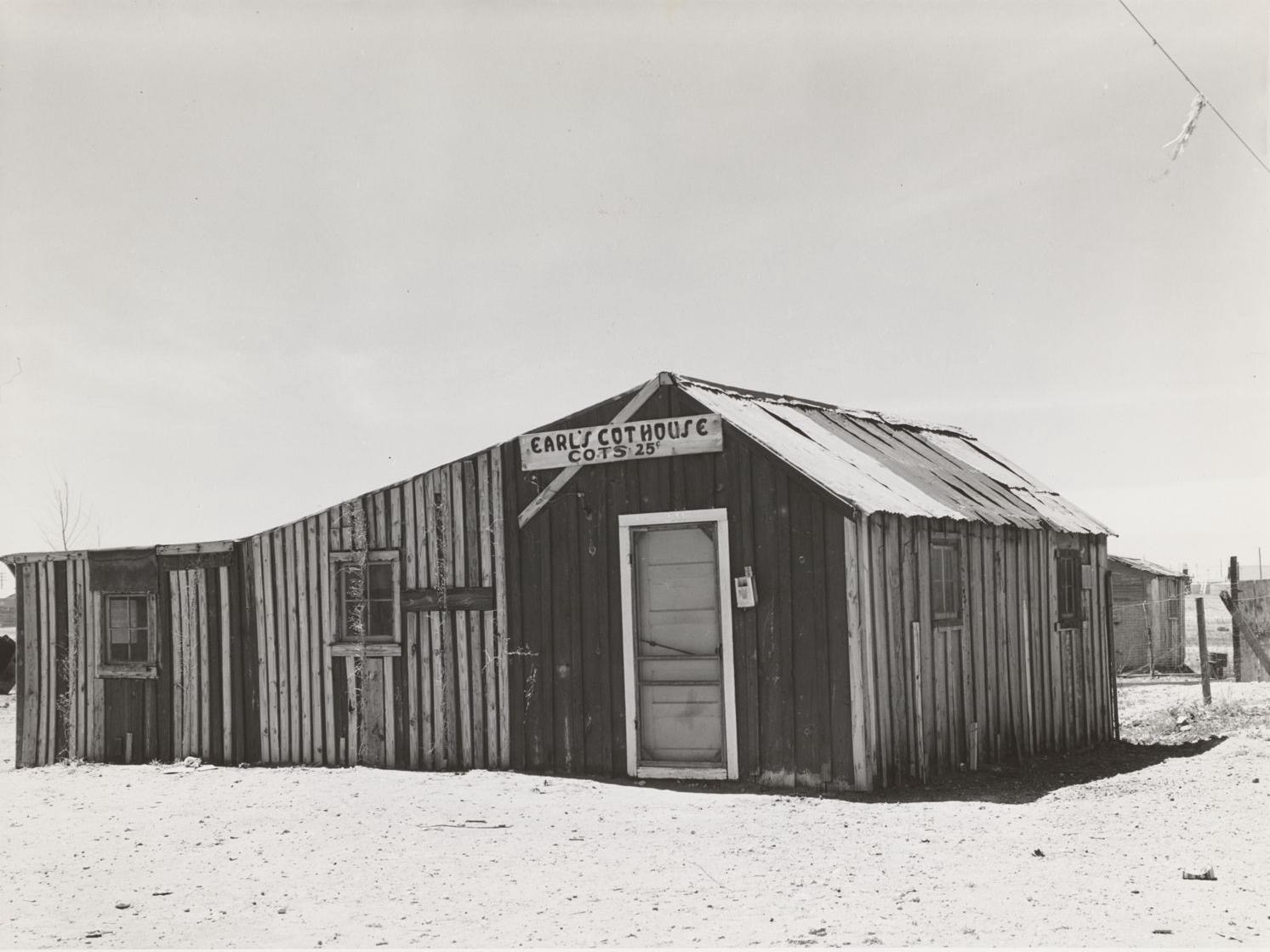
Russel Lee: Cot house in the oil town of Hobbs, New Mexico. Hobbs is now experiencing a boom and the cot houses are necessary for the swarms of workers who come in. This is typical of all oil boom towns. (1940) United States. Farm Security Administration
"I'd been shipwrecked before. I knew the routine."
Until The Muse and I were Exiled following our unfortunate bankruptcy, I hadn't understood how Experienced I had been at the odd art of exiling. Anyone accustomed to living and working in a place might never suspect a simmering exile economy surrounding them. Traveling salespersons might live in perpetual exile, as do consultants. I had been a consultant before the crash, so I had grown accustomed to working anywhere but home. One year, I stayed in fifty different hotel rooms and a few for longer than overnight. Each business trip amounted to a practice exile, for I would be rechallenged to find a cup of decent decaf and an acceptable bakery. I ultimately came to pride myself on being able to locate both within an hour of landing in any strange city. Traveling for a living seemed little different from being Exiled, except for the returning home part.
Leaving home was another matter.
Exiled
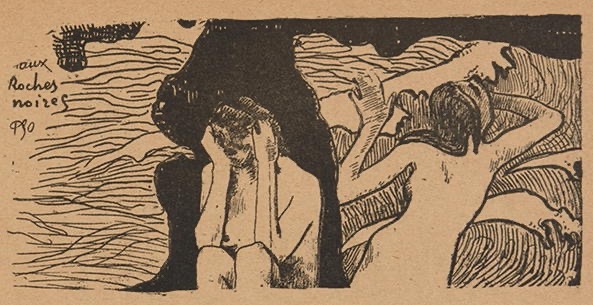
Paul Gauguin:
cover art for Catalogue de l'Exposition de Peintures du Groupe Impressionniste et Synthétiste
[Catalogue of the Exhibition of Paintings of the Impressionist and Synthetist Group] (1889)
Book containing eight zincographs and letterpress text
in black ink, with photomechanically printed gray stripes on cover, on tan wove paper
"I never learned how to feel as though I belonged there."
In late March 2009, The Muse and I left our beloved Villa Vatta Schmaltz for an indeterminate exile. Over the prior month, our local newspaper had published my series of essays entitled The White Collar Recession, which recounted our recent dénouement, our fall from grace. The prior autumn's economic crash had left our once-thriving business and us bankrupt. Coming concurrently with my father's death, the blow had been devastating. We fully expected to lose everything, including our beloved Villa, once the symbol of our success turned into our most visible evidence of failure. The bankruptcy administrator found us faultless, but his judgment did little to assuage our feelings. We were less than a month away from moving into a barrel when The Muse was offered a prestigious job with one of the Department of Energy's National Laboratories. The rub was that we would have to relocate far from the center of our universe. When entering that stage of life where we had been expected to be winding down our wandering, we were forced to rewind ours. By the time the newspaper declared my White Collar Recession their second most popular series of the year, we were no longer there, for we had been Exiled.
We landed in a close suburb of Washington, DC, Roslyn, Virginia, in transition housing, a sixth-floor apartment overlooking a firehouse and beneath the final approach to National Airport with two restless, edgy cats.
Graceful

Julia Rogers: Three Graces (1939 - 1943)
" … each seems willing to show up for the cast party following each performance."
I might not live that elegant of a life, but I aspire to live a Graceful one. Not necessarily a well-choreographed or excellently executed existence, but at least a decent one. The presence of Grace in my life might ensure such a fate, for Grace smoothes over otherwise obvious imperfections. The object of life doesn't seem to be perfection but something much closer to imperfection instead. We seem to be given imperfections with the intention of perfecting them. Not to make them perfect, but, as Lincoln insisted, to make them somehow more perfect than before we encountered them. We try to improve. Not all of our efforts succeed, nor do we necessarily intend to succeed in handling all of them. We fail plenty, then begin again, perhaps more humbly than we initially engaged. There might be more Graceful potential in any odd failure than in any unbridled success. Remember, blessèd are the poor, weak, meek, and destitute. Those in desperate need of Grace seem quite naturally to employ it better.
My summer has been a fairly unextraordinary one.
Weekly Writing Summary For The Week Ending 9/19/2024

Lewis Wickes Hine: Syrian-Arab, Ellis Island (1926)
And Properly So
My Summer Of Discontent coexisted with my writing this Grace series. I see now, as the Summer and discontentment fades, that I spent my summer suffering from one of the more ordinary blindnesses, the one that sees the present altogether too clearly, and so cannot adequately either see past or foresee future. Presence never was an end-all or a be-all, but merely one of the simultaneous states informing and misleading us, in probably roughly equal proportions. The heat gets me but not nearly as thoroughly as I can get myself. I can see in retrospect what I could not even suspect prospectively. Every long-suffering experience quickly turned to dust, the same as every thoroughly satisfying one. I actually accomplished something this summer in spite of or, perhaps, because I was suffering. Summer wrought what summers have always wrought: Autumn, and all the uncertainty that season has ever brought. By the time the next three months have passed, I will have experienced snow again and re-engaged in my annual Seasonal Affective Disorder dance. This could become my Autumn of Discontent, but I've grown weary of discontent. It alters nothing but the quality of my experience. It apparently cannot even chase away Grace, for here, at the very end of my Summer Of Discontent, I hold a completed journal of my experience entitled Grace, and properly so.
Level

Level: Classification Artists' Tools (20th century)
"There once was a crooked man who lived in a crooked house …"
Level amounts to an abstract concept in The Villa Vatta Schmaltz. Built in 1907, the old place has been settling unevenly into place ever since. When remodeling, we must remember that we're restoring relative to what the eye recognizes as Level. That value might differ considerably from what my old Cherrywood Level might propose. An unbalanced roofline was the chief reason we began refurbishing the front porch. When approaching from down the facing street, the house seemed stuck in a permanent shrug, losing at least six inches across the twenty-foot roof line. We'd thought then that the bricks we believed supported the roof were failing, but those bricks were never more than ornamental. They never supported anything. That roofline had been trying to support itself and ultimately began to fail. That it managed to support itself for who-knows-how-long stands as a testament to our good fortune. We might have had to clean up a catastrophic failure instead of merely making the roof line Level again.
As with most projects, this one began under false premises.
Whimpered
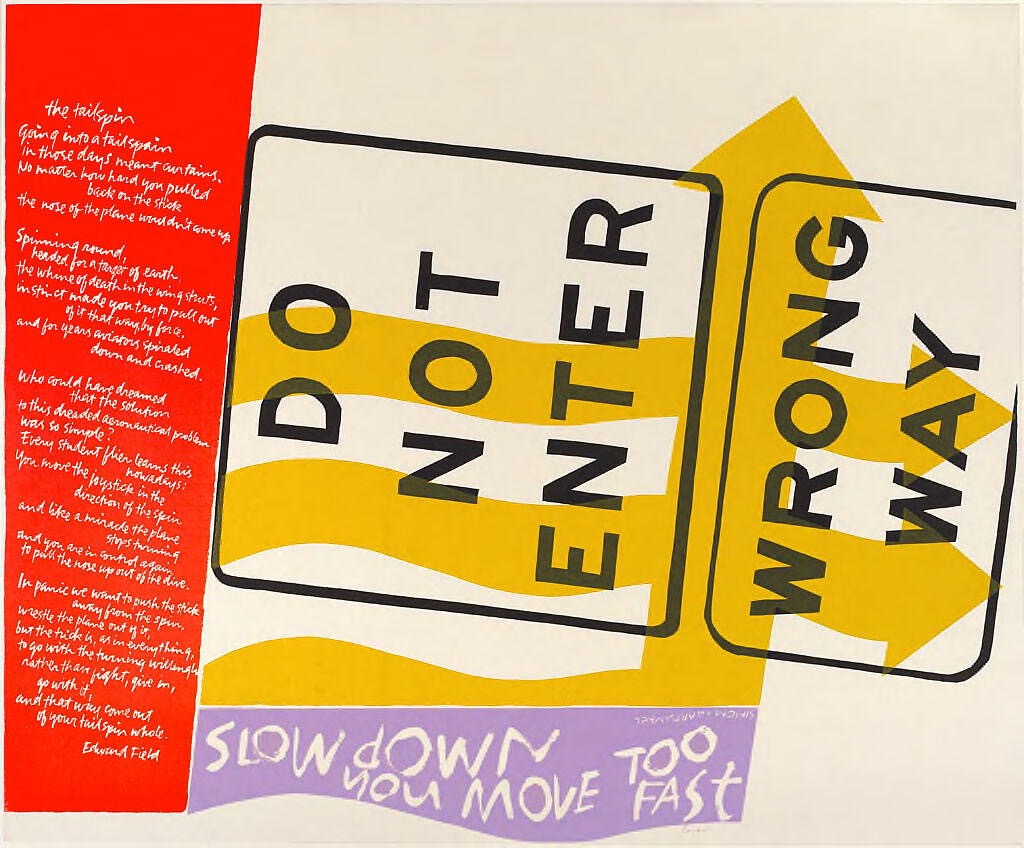
Corita Kent (Sister Mary Corita):
feelin' groovy [print] (1967)
Signed: l.r.: Corita
(not assigned): Printed text reads: DO NOT ENTER / WRONG WAY / The tailspin / Going into a tailspain in those days meant curtains. No matter how hard you pulled back on the stick the nose of the plane wouldn't come up. Spinning round, headed for a target of earth, the whine of death in the wing struts, instinct made you try to pull out of it that way, by force, and for years aviators spiraled down and crashed. Who could have dreamed that the solution to this dreaded aeronautical problem was so simple? Every student flier learns this nowadays: you move the joystick in the direction of the spin and like a miracle the plane stops turning and you are in control again to pull the nose up out of the dive. In panic we want to push the stick away from the spin, wrestle the plane out of it, but the trick is, as in everything, to go with the turning willingly, rather than fight, give in, go with it, and that way come out of your tailspin whole. Edward Field / SLOW DOWN YOU MOVE TOO FAST Simon + Garfunkel
"Most good work ends with something other than a bang …"
The concrete work Whimpered when it ended. There were no ticker-tape parades, no marching bands. No heavenly hosts singing through the firmament. It was almost a non-event. Three remaining crew members worked the walls to a smooth finish. All the pomp and circumstance involved in the BIG pour was absent. I set three cold beers into the ice chest and pointed the survivors in their direction. The next thing I knew, they were pulling away from the curb. Pablo, the concrete contractor, called a while later to say he'd return the following morning to see how the last coat dried. I told him I wanted a walk-around so we could appreciate the work before I wrote him a check. There are odds and ends to finish and a more thorough cleaning of the area, but Jesse, our structural contractor hired to prop up and level the porch roof, will make his mess, and he's next on the agenda; this ending only a way station on the way toward final completion weeks or months hence.
Sports competitions materially misrepresent how contests work.
RidingBus
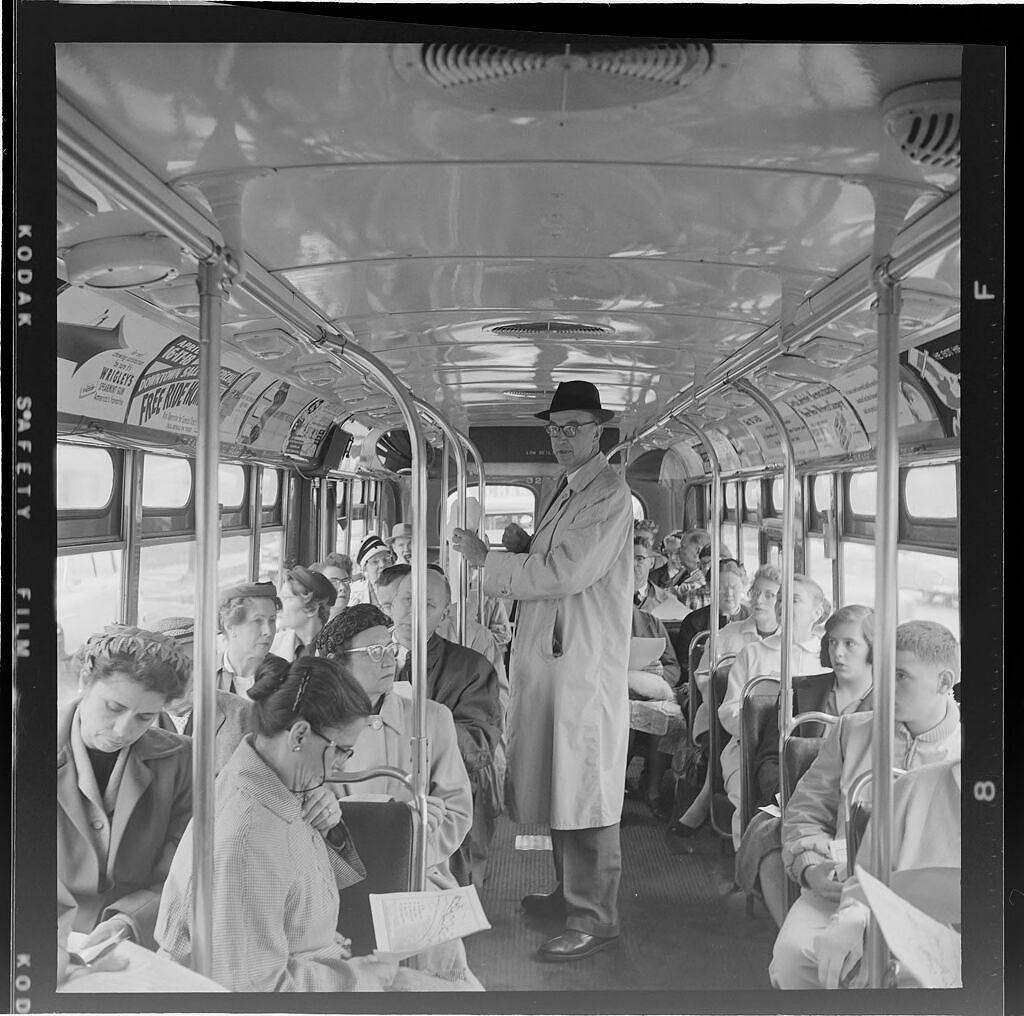
Jack Gould: Untitled [passengers on crowded city bus] (c. 1950)
" … prefer to wait on the corner for their next ride to anywhere."
The Grand Other enrolled in a new school this term, so her last year's school bus routine wouldn't get her there. She'd have to ride the city bus, something with which she had zero experience. Further, her older sister had filled her with stories about how rough the city bus could be, so she was understandably hesitant even to try that ride. Her mom and dad both went to work long before The Other would have to leave for school, so she was left with a dilemma. Fortunately, her grandfather is an enthusiastic bus rider, and seeing opportunities to engage in one of his favorite activities, he volunteered to introduce her to the lifestyle.
I consider RidingBus to be a lifestyle, a choice.
Anniverse
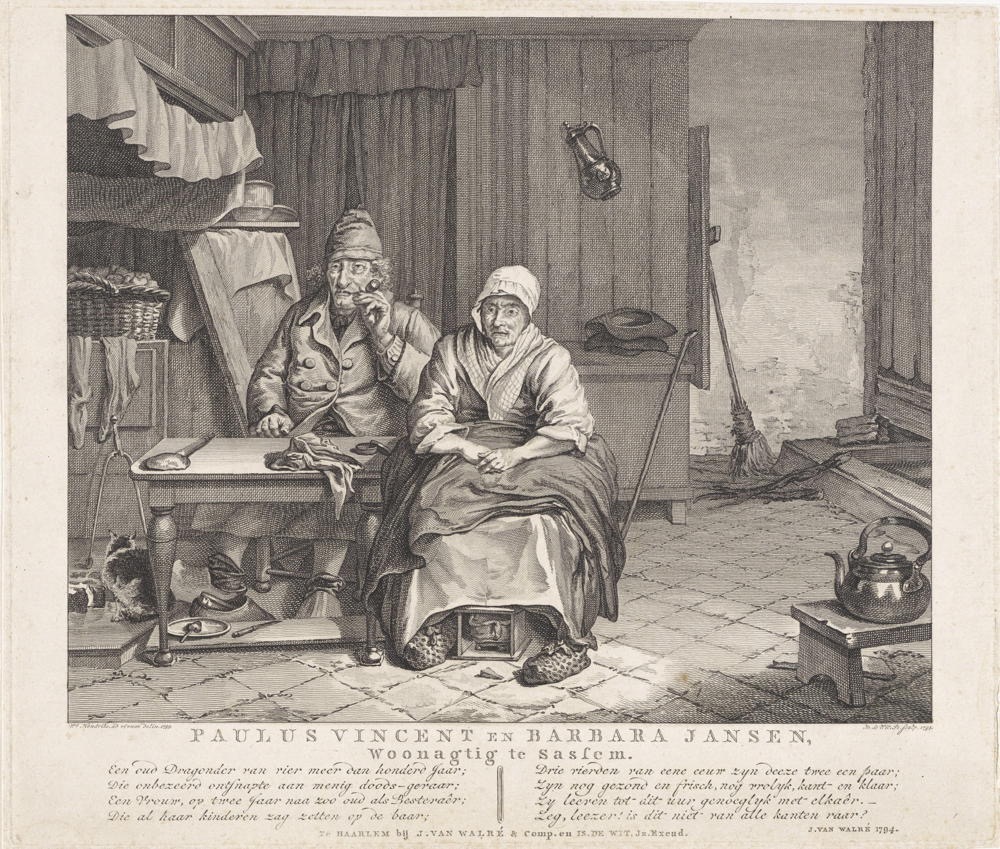
Izaak Jansz. de Wit, after Wybrand Hendriks:
Echtpaar in een boeren interieur
[Couple in a farmer's interior] (1794)
" … we continue forward somehow."
Some dates seem to attract events. My father and nephew were, for instance, born on the same day/month, January 15, and that became an annually celebrated anniversary greater than the simple sum of two birthdays. My first wife's younger sister was born on Norwegian Independence Day, Syttende Mai ("Seventeenth of May"), elevating that anniversary into a super holiday for that Norwegian family. What one says on such days tends to be the same, ever older stories, grown perhaps even more remarkable with each retelling. For the Muse and I, September 15th must undoubtedly be our most prominent anniversary. It's the day we met twenty-seven years ago, and it carries ever greater nostalgia and significance with each passing year. This year, additional significance attached itself to the day when The GrandOtter, The Muse's granddaughter Sara, gave birth to our first great-granddaughter, making us both great-grandparents.
Such significances always seem unlikely, though double occurrences cannot be described as rare.
ImperfectlyLegal
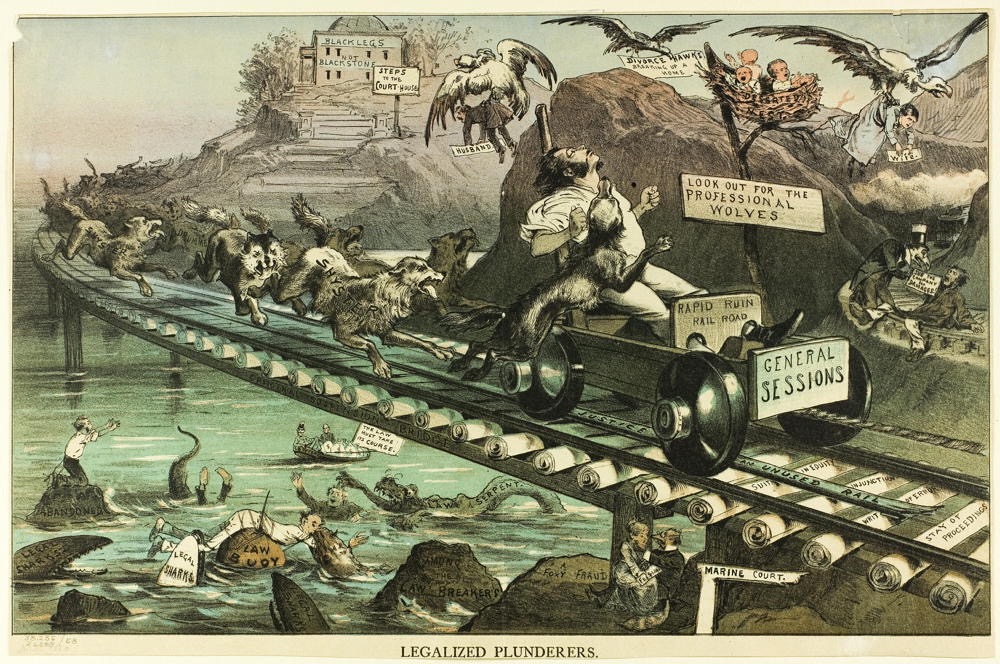
Unknown Artist: Legalized Plunderers, from Puck (1880)
" … fly coach with their constituients when on the people's business."
The Muse and I last night attended a neighboring county Democratic Party's annual celebration dinner featuring a visit from our spectacular United States Senator Maria Cantwell. A visit with her when she was visiting Walla Walla in June yielded The Muse a senatorial letter of intent for an important Port project and me an appreciative interest in my Blind Men and the Elephant Book. We attended the dinner in hopes of continuing the conversation we'd started and also to revel in what is turning out to be a genuine banner year in the history of our Democratic organizations. The dinner was held at a union hall, where we learned that Biden's term has resulted in a record number of apprenticeships and jobs. That county's economy's on fire!
We were seated at a table with a couple of former school teachers who retired from the Seattle suburbs and moved over into the less urban east of the Cascades.
Senses
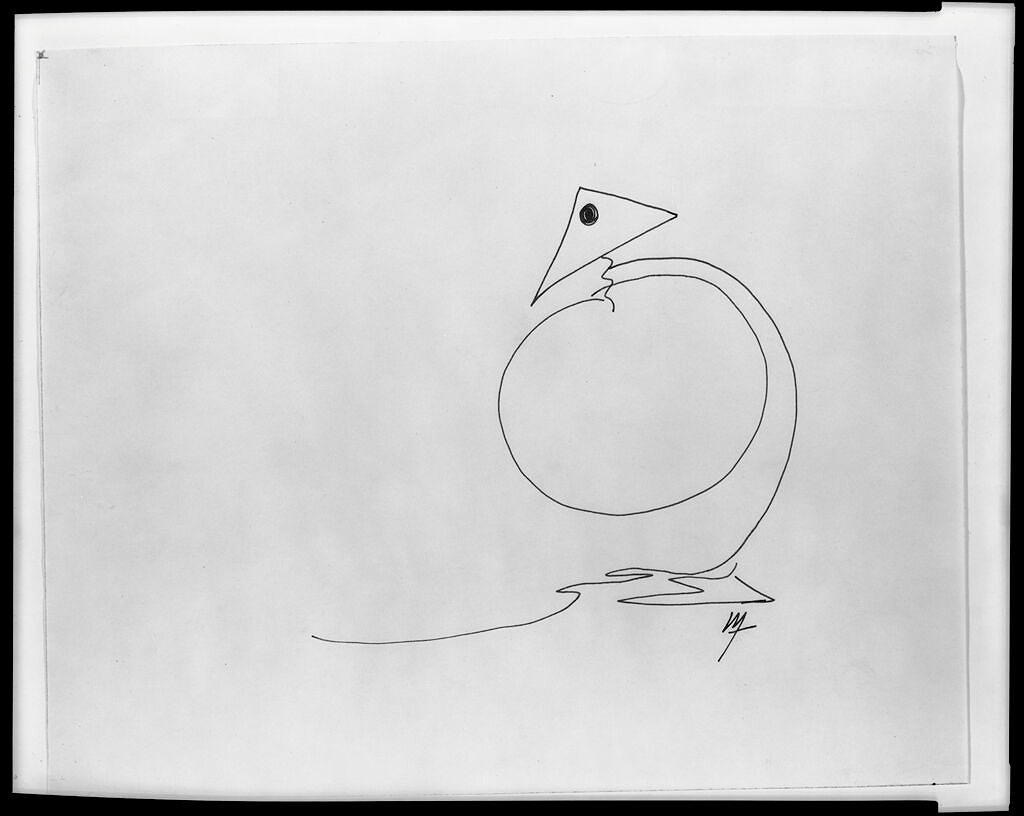
Margaret Fisher: With a Sense of Humor (20th century)
" … Presence isn't quite ready to make sense to us again."
I feel moved to consider Senses in this story. Not the usual sight, smell, taste, hear, and feel, but a parallel or even an orthogonal set familiar to everyone: Insense, Outsense, Absense, and Presense. I could throw in the sense of humor, too, and any others that might only come into focus once I start this consideration. I propose this plotline because The Muse and I experienced a shocking Absense over recent days, the sudden disappearance of a presence that had come to kind of define us. Loss seems ordinary enough. We slough off plenty in our regular day-to-day existence, and life itself depends upon death. Everything we consume except milk, honey, water, and air depends upon something dying for sustenance, so we're certainly not strangers to Absense.
The steelhead filet I carefully grilled over hot coals before dinner last night disappeared shortly after that, never to return.
Weekly Writing Summary For The Week Ending 9/12/2024

Preston Dickinson: Self-Portrait (c. 1926)
Qualifies As A Feeling?
I mostly feel lucky even though lucky probably doesn't fully qualify as a feeling. Further, luck must be utterly out of my control, or else it's not really luck because luck if it's governed by anything, must be ruled by randomness. One might harbor feelings about impending luckiness but only experience luck once it happens. How often do I "feel" lucky without experiencing an actual manifestation of luck? How frequently do I experience luck without having a premonition of its arrival? Both questions seem as unnecessary as they are unanswerable. I might cringe when Friday the Thirteenth comes around, regardless of which day of the week it lands on that month (Thanks, Walt Kelly!), but I cower for nothing more or less than randomness. Not to downplay randomness, for it was probably the force that resulted in us. It routinely produces unlikely results if only because we cannot calculate the likelihood for most results. We might be equally blessed and cursed by randomness, just as lucky or unlucky as we expect to be, depending primarily upon our expectations, which are rarely random and most often focused on feeling luck as if luck even qualifies as a feeling.
GoodMeasure
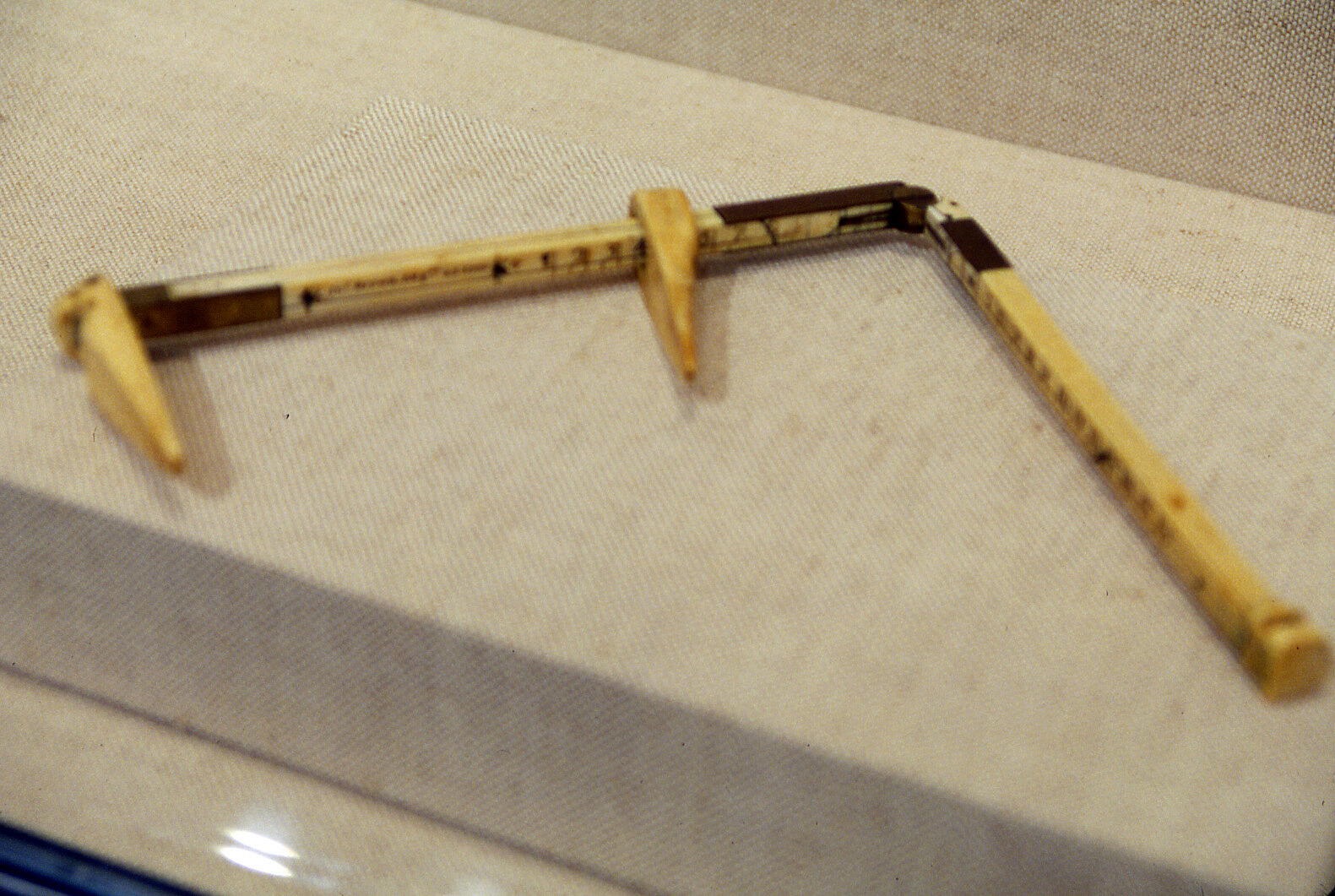
Unknown Artist:
Ivory and Brass Folding Shoe Measure (1738)
" … I feel deeply sorry for that absence."
I recently happened upon a Neil DeGrasse Tyson video where he explained how, in high school, he acquired his first calculus textbook. He admitted that he initially felt utterly intimidated by the gibberish he found inside. He explained that the jump from algebra to calculus is greater than from arithmetic to algebra. Even so, as weeks went by, he came to catch himself understanding ever more of the previous gibberish so that within that quarter, he'd come to rely upon those previously baffling formulas. This seems the typical testimony of anybody's mastery. It tends to grow upon them slowly, perhaps eventually leading to a flash of realization. Not everyone finds mastery, though, and those who don't often remain baffled about why they couldn't experience that shift.
I was making small talk when driving The Grand Other to school yesterday.
Revealed

Unidentified Artist
[after Rembrandt Harmensz. van Rijn]:
The Blind Fiddler
-Alternate Title: Blind Fiddler, Led by His Dog
(1631)
" … all will shortly be Revealed."
And so it came to pass that after a weekend drying in the late summer heat, the new concrete porch portal watched the crew return to remove its forms. Screws whirred out, and pry bars separated painstakingly-prepared form faces, oiled chamfer strips and insets intact. Over a scant couple of hours, the place had a new face, one that was in no way familiar. By morning's end, after all those boards had been loaded into a trailer, the yard was bare for the first time in almost a month, and our new home stood before us. The concrete was darker than it would seem by week's end, as Pablo, our concrete contractor, explained. The finishing had already begun. Each edge would be sanded or ground, imperfections filled with a putty-like substance, then sanded or ground again. They will repeat this process until no blemishes remain. It's painstaking work again, back-breaking in its own way, requiring delicacy this time rather than brawn.
The new face seems massive.
Lap-Sitting

Lucian and Mary Brown:
Untitled [boy sitting in woman's lap] (c. 1950)
" … just run-of-the-mill reassurance."
I have proudly possessed a string of Lap-Sitting cats. My current one, Max, finds me most mornings, drowsy and tentative, sitting and staring out the library window. He tries to hop up stealthily, but that's generally beyond his ability. He tromps around the place in those pre-dawn hours. I can hear him coming from clear across the house, for his are no mere little cat's feet. He most often enters from the upstairs window, landing at the end of the hallway with a definite thump before proceeding down the hall to the stairs, which he makes ring with each step, down into the entry hall before turning through the dining room and into the living room where he finally fails to sneak up behind me. He can still surprise me with his timing, though. He suddenly appears on the chair arm, sometimes managing to get tangled up with my arm, whereby he aborts the attempt. He'll sometimes slink away then and not return, but he often mounts a second try, landing off balance in the vicinity of my lap. He often requires a little nudge and some guidance to find a comfortable position before settling in for some serious Lap-Sitting.
I adjust my schedule for these visits, which usually seem far too brief.
Greatness

Edward Ruscha:
Angry Because It's Plaster, Not Milk (1965)
©Edward Ruscha, Fair Use
"Thank you for your patience."
My Greatness must have evolved in me, for I was not born Great or, indeed, born to Greatness. I believe that something, not Greatness, was, however, inborn in me that helped me achieve what nobody who knew me then would have foreseen as my emerging Greatness. The preconditions must have been there, however unnoticed, because leopards never change their spots. Nobody knows how leopards first acquired their spots, only that once possessed, they're never lost. I suspect that Greatness carries a similar distinction because it knows no comeuppance. Once emerged, it's present. Once noticed, it's no longer tacit. It becomes the defining attribute of anyone who owns it, though some insist that Greatness owns its incumbents. Either way, I say it's Great to experience Greatness. Those who have never experienced their own Greatness couldn't possibly understand. Whatever Greatness anyone who's not Great ever notices isn't even distantly related to what that one with genuine Greatness experiences. I'm shocked when anyone even mentions my Greatness, for how could they possibly know of what they speak? True Greatness comes through suggestion: the great must introduce themselves to the unwashed. Some insist that Greatness is exclusively a function of auto-suggestion, though I strenuously disagree, as would anybody possessing the Greatness pedigree.
I'm impressed with how language evolves out from under even its strictest adherents.
Assembling
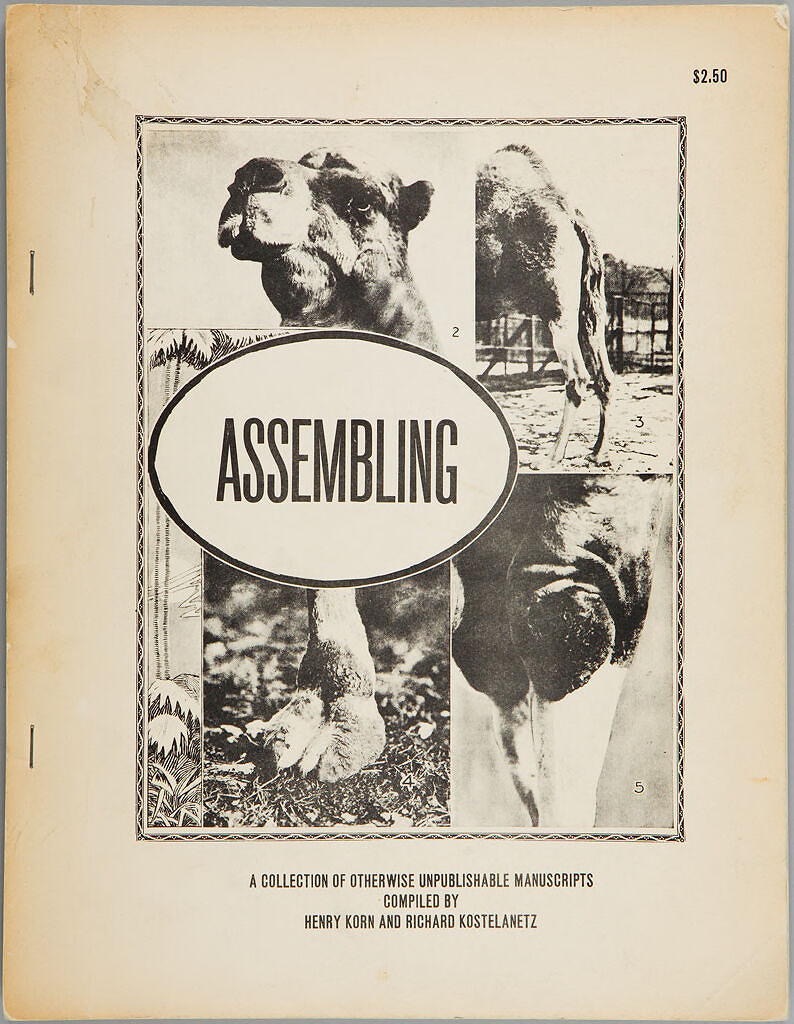
Edward Ruscha: Chocolate
[Series/Book Title: Assembling, vol. 1,
Henry Korn and Richard Kostelanetz, compilers
Brooklyn: Gnilbmessa inc. (1970)
" … genuinely qualifies as work worthy of shirking."
The final fortnight of each quarter, my thoughts turn to Assembling. If disciplined in my writing that quarter, I will have completed ninety stories, each written under the presumed aegis of that quarter's theme or stated purpose. This quarter, I've been writing Grace stories, though not every piece necessarily seems on topic. If I squint, I can see how I interpret each piece to have fully satisfied its theme, though I seem like an over-insistent assistant district attorney prosecuting my case. Assembling involves bringing each story together in one place so that it might appear to be a manuscript where I can number pages and list chapters in a Table of Contents. The manuscript amounts to the least helpful form for every purpose except one, that of publishing.
Given that I have not published any of the stories I've been creating over the last twenty-nine quarters, I've primarily considered Assembling an optional activity.
Porchy
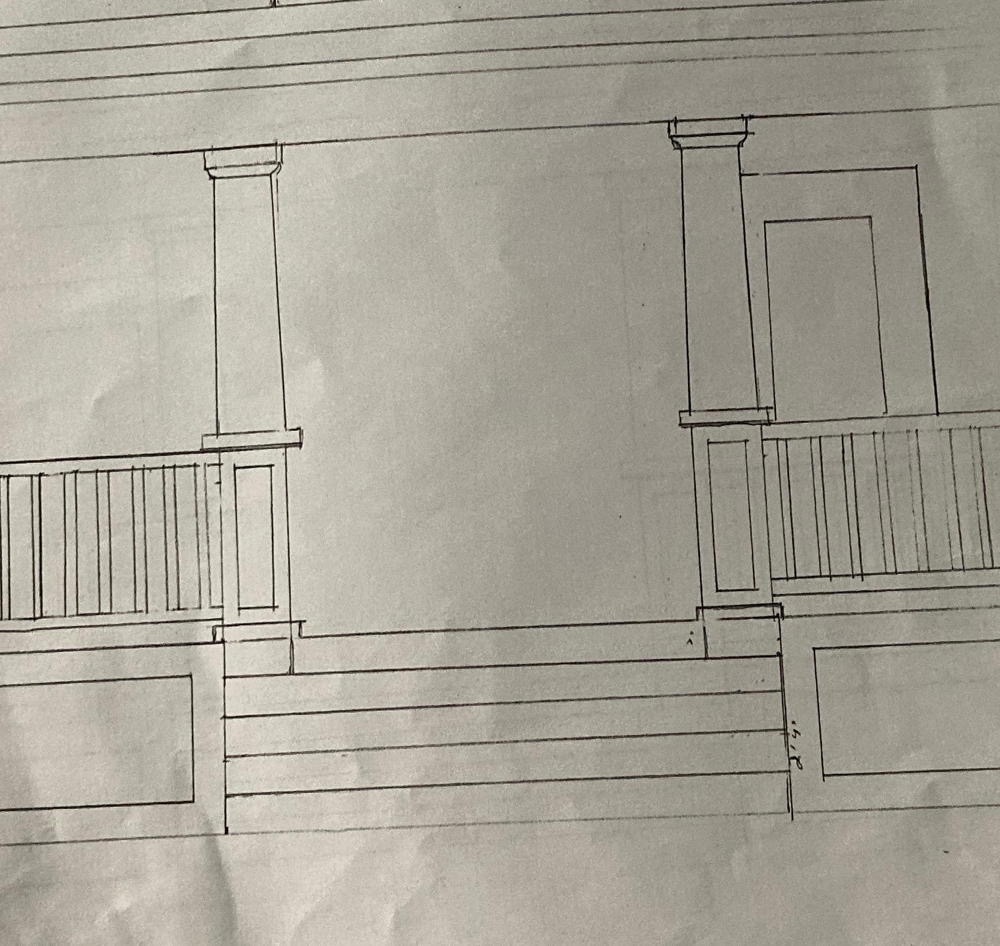
The Muse's rendering of our finished porch remodel.
"Those without the patience of Job experience the amateur's impatience …"
When creating something, the creator must somehow tolerate a lengthy period where that something does not yet even distantly resemble the end product. The difference between amateur and artisan might be measured in the distance between their patience. Impatience seems the constant companion of the amateur and forbearance, the artisan's eventual nature. The patron's left wondering if their investment will ever pay off. Pablo, our concrete contractor, aspires to be the artisan he only occasionally is yet, though he's coming along. Yes, he did get a little ahead of himself when pouring that first footing and failing the following four inspections. His comeuppance tried everyone's patience, especially his. We ended up with a footing so over-engineered that it will still be here through centuries hence. Whoever tries to turn The Villa into a teardown will curse our existence.
Preparation for the Big Pour consumed more than a week, with constructing forms and fitting them with wooden strips to produce insets and beveled corners.
Weekly Writing Summary For The Week Ending 9/05/2024
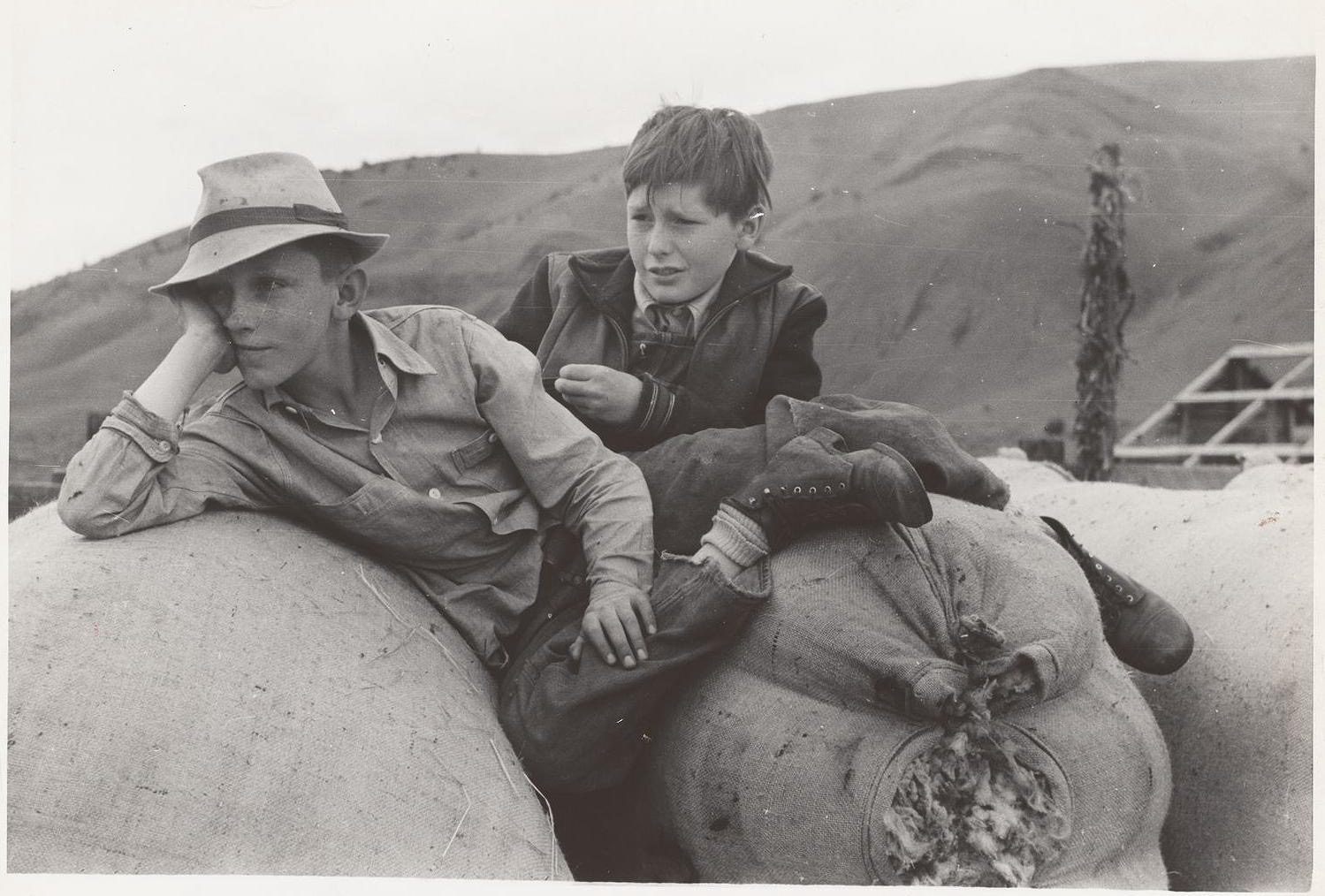
Russell Lee:
Boys on sacks of wool, Malheur County, Oregon (1941)
United States. Farm Security Administration
Almost Exclusively In The Dark
The dust turns to talcum powder as August becomes September. School starts, and I volunteer to show The Grand Other how to ride the bus, but the bus route closed down due to road construction work. I drove her to school, reveling in the opportunity to influence her. I feel compelled to offer her the benefit of my experience, even though she doesn't seem to appreciate my attempts. I know my influence won't be immediate, though it might prove insidious. Grandparents are widely recognized for their insidious nature. We plant seeds we know we'll not see flower; our indifference remains our probable superpower. Few things cannot be improved by the judicious application of sincere indifference, and I can see and raise any indifferent move our granddaughter might attempt. She suffers from the certainty that she can see right through me, but I am not nearly as transparent as I probably appear to her. I'm dense and defensive from a longer lifetime of engaging. I can't quite remember the certainty of my youth, but I considered it considerable then. I earned my comeuppances, and while I'd hope The Other might benefit from them, I understand the rules of this game preclude her directly learning anything from me. That's why I go subversive. She cannot see and might never perceive, though the possibility will always remain. Decades from now, one of my odd comments might finally find its mark. Like everybody, I live almost exclusively in the dark.
Approximately
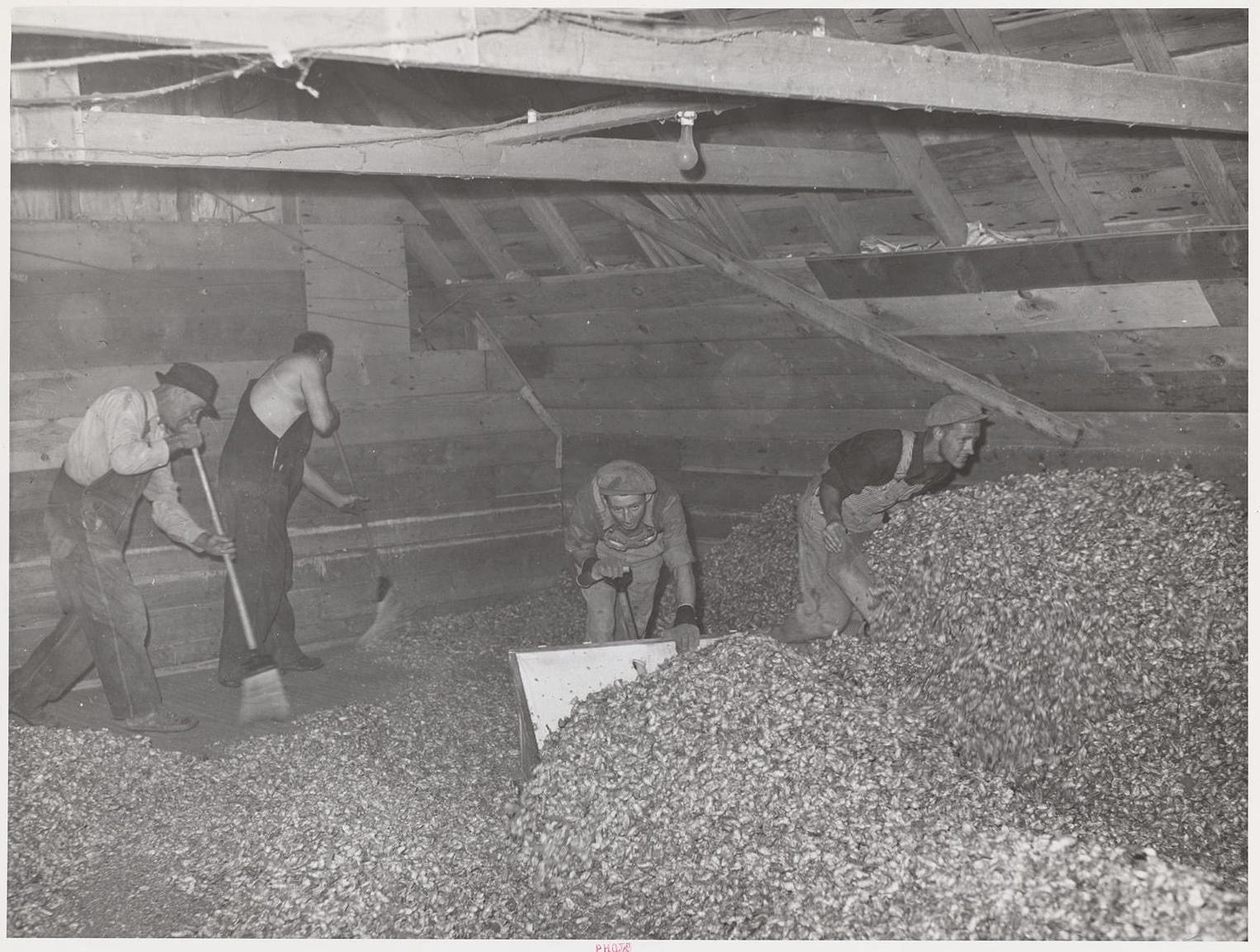
Russell Lee:
Scooping and sweeping dried hops
from drying room to adjacent room
where they will be baled.
Yakima County, Washington.
There is approximately twenty-five percent
dryout of hops (1941)
United States. Farm Security Administration
"You guys figure out the exact measurements between you."
I am an Approximately person. I do not deal in preciselies. I broadly estimate impacts and generally thrive. I do not appear to have the sort of mind that derives details. I see impressionistically. To my mind, Renoir and Monet painted with photographic clarity. Details lose me. I take measurements to immediately forget them. When Pablo, Our Concrete Contractor, asks my opinion, I refer him to Jesse, our Structural Guy, or Joel, Our Carpenter, for I cannot seem to retain a memory of exactly what we decided when we discussed design. How high the supporting wall should be poured does not reside in my head. I might notice when a disagreement emerges, but I will not be the one resolving the question. For that, we need to convene a conversation. I called Jesse and Joel after it seemed Pablo was measuring from the wrong surface. I could neither confirm nor deny a problem. I held suspicions. I'd also insisted that Pablo call Jesse and Joel. I was trying to encourage some conversation. Why is it so hard for people to talk with each other?
It would have been an excellent idea for us to detail the design of our front porch refurbishing before we started demolishing its past.
FiveHundredMiles
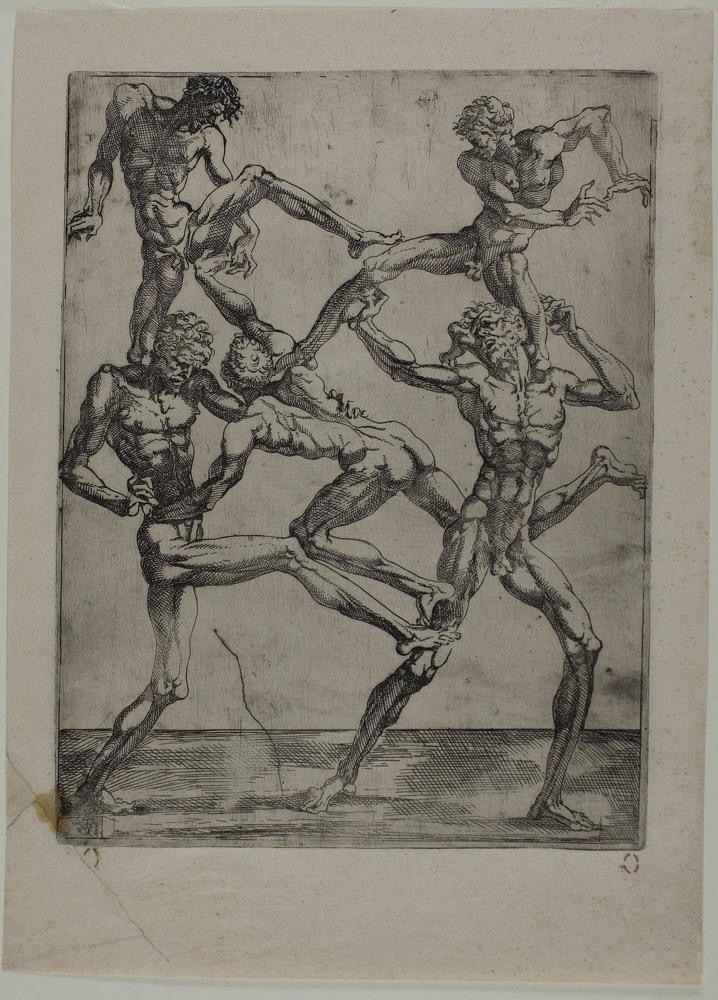
Juste de Juste: Pyramid of Five Men (c. 1543)
" … closed on Tuesdays forever."
My pioneer forebears would have counted themselves uncommonly fortunate had they been able to make twenty miles a day for a month. That would have gained them about what I drove yesterday in just eight hours. FiveHundredMiles seems like a vast distance. We rarely drive more than three hundred miles in a day, and even then, we feel the miles when we arrive. But I needed to run a couple of errands in Portland, and the schedule suggested I might spare no more than a day, so I decided to try. I'd initially figured I'd drive alone since The Muse's schedule's more crowded than mine, but the night before, she sheepishly asked if she might tag along. When I assented, she quickly cleared her schedule. "You'll have to be ready to go by seven," I cautioned. Over and back in a day works best when accomplished in daylight.
We got away by eight.
Helpless
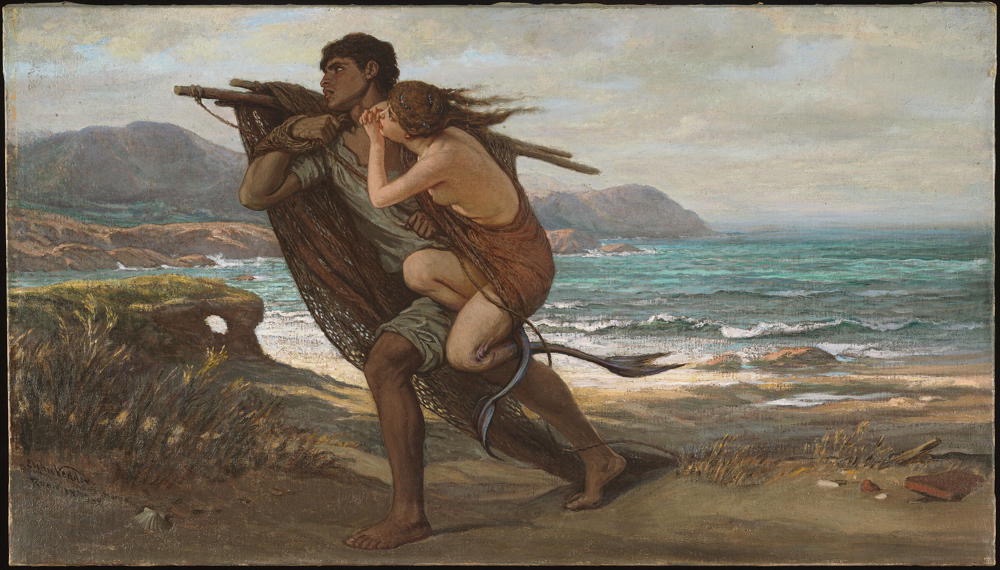
Elihu Vedder: Fisherman and Mermaid (1888-1889)
" … I prefer to do my own ironing."
I am, like all males, Helpless in many ways. All men avoid developing certain skills for a wide variety of reasons. I, for instance, cannot dust. I tell The Muse it's because my failing eyesight cannot discern dust from whatever it’s covering, but since my cataract surgeries left me with nearly 20/20 vision, that reason lacks believability. I still stick by it, dusting being, by personal affirmation, beyond my calling. Nor do I sew, although tailors are often males. My mother was a very talented seamstress, so I probably inherited the genes, and The Muse likewise sews like a pro, so I don't lack a qualified mentor. Yet, I'm sure that sewing remains far beyond my skill set. I am also nobody's auto mechanic or technical support. Anything with many moving parts requiring a precision hand lands outside my skills, abilities, and experiences, or so I insist.
I probably drew my competence lines for reasons other than my lack of fine motor skills.
Fairing

Johann Theodor de Bry:
Little Village Fair (16th-17th century)
"The less than generous sociologist in me steadfastly refuses to see the resemblance."
Last week was Fair Week in the Valley They Liked So Well They Named It Twice. The Southeastern Washington Fair and Rodeo has been an annual event since the eighteen-sixties. It was a highlight of every one of my summers growing up, occurring just when the new school year was starting. We'd begin the school year the Wednesday before Labor Day, then take the following Friday and Monday off. No better way to start a new school year than with a four-day weekend! That Friday would be Kids' Day, and we would flood the fairgrounds to ride the rides, eat the food, and win goldfish that were inconvenient to transport home. We'd wear Rosellini for Governor buttons and dutifully tromp through animal barns and pavilion displays. In its day, the Fair seemed a pretty perfect portrait of our small city's personality, from the Saturday morning parade to the parimutuel horse racing.
The Fair seems less grand now.
F_J_B

H. R. H.: Pen Pictures of the Leading Events of the Last Week, from Chicago Tribune
(Published Feb 26, 1893)
" … they are not incorrect."
I solo worked our candidate's booth at the fair, casting for and reeling in potential voters. I'd learned the technique watching The Muse last year when she was running for the position of Port Commissioner, an election she went on to win. The Muse is a naturally gifted retail politician, which means she can attract attention and gain support. Not every candidate comfortably projects themself onto others, and not every potential voter necessarily appreciates a candidate reeling them in. She'd ask innocuously: "Are you a voter here?" The answer winnowed out the many out-of-town visitors to our fair. Anyone answering was hooked. Many remained oblivious, almost invisible, as they moved through the crowd. She could usually tell if someone was conservative because they'd turn their head a quarter turn away, deliberately not seeing her there, casting into the crowd. They'd become deaf, too, suddenly unable to hear her question.
Those who responded could be reeled in with a follow-on question, and some would soon find themselves engaged in good-hearted conversation.


